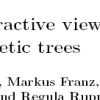| |
  
Celine Scornavacca,
Simone Linz and
Benjamin Albrecht. A fi�rst step towards computing all hybridization networks for two rooted binary phylogenetic trees. In JCB, Vol. 19:1227-1242, 2012.
Keywords: agreement forest, explicit network, FPT, from rooted trees, phylogenetic network, phylogeny, Program Dendroscope, Program Hybroscale, reconstruction.
Note: http://arxiv.org/abs/1109.3268.
Toggle abstract
"Recently, considerable effort has been put into developing fast algorithms to reconstruct a rooted phylogenetic network that explains two rooted phylogenetic trees and has a minimum number of hybridization vertices. With the standard app1235roach to tackle this problem being combinatorial, the reconstructed network is rarely unique. From a biological point of view, it is therefore of importance to not only compute one network, but all possible networks. In this article, we make a first step toward approaching this goal by presenting the first algorithm-called allMAAFs-that calculates all maximum-acyclic-agreement forests for two rooted binary phylogenetic trees on the same set of taxa. © Copyright 2012, Mary Ann Liebert, Inc. 2012."
|
|
| |
   
Benjamin Albrecht,
Celine Scornavacca,
Alberto Cenci and
Daniel H. Huson. Fast computation of minimum hybridization networks. In BIO, Vol. 28(2):191-197, 2012.
Keywords: explicit network, from rooted trees, minimum number, phylogenetic network, phylogeny, Program Dendroscope, Program Hybroscale, reconstruction.
Note: http://dx.doi.org/10.1093/bioinformatics/btr618.
Toggle abstract
"Motivation: Hybridization events in evolution may lead to incongruent gene trees. One approach to determining possible interspecific hybridization events is to compute a hybridization network that attempts to reconcile incongruent gene trees using a minimum number of hybridization events. Results: We describe how to compute a representative set of minimum hybridization networks for two given bifurcating input trees, using a parallel algorithm and provide a user-friendly implementation. A simulation study suggests that our program performs significantly better than existing software on biologically relevant data. Finally, we demonstrate the application of such methods in the context of the evolution of the Aegilops/Triticum genera. Availability and implementation: The algorithm is implemented in the program Dendroscope 3, which is freely available from www.dendroscope.org and runs on all three major operating systems. © The Author 2011. Published by Oxford University Press. All rights reserved."
|
|
| |
   
Leo van Iersel,
Steven Kelk,
Nela Lekic and
Celine Scornavacca. A practical approximation algorithm for solving massive instances of hybridization number. In WABI12, Vol. 7534(430-440) of LNCS, springer, 2012.
Keywords: agreement forest, approximation, explicit network, from rooted trees, hybridization, phylogenetic network, phylogeny, Program CycleKiller, Program Dendroscope, Program HybridNET, reconstruction, software.
Note: http://arxiv.org/abs/1205.3417.
Toggle abstract
"Reticulate events play an important role in determining evolutionary relationships. The problem of computing the minimum number of such events to explain discordance between two phylogenetic trees is a hard computational problem. In practice, exact solvers struggle to solve instances with reticulation number larger than 40. For such instances, one has to resort to heuristics and approximation algorithms. Here we present the algorithm CycleKiller which is the first approximation algorithm that can produce solutions verifiably close to optimality for instances with hundreds or even thousands of reticulations. Theoretically, the algorithm is an exponential-time 2-approximation (or 4-approximation in its fastest mode). However, using simulations we demonstrate that in practice the algorithm runs quickly for large and difficult instances, producing solutions within one percent of optimality. An implementation of this algorithm, which extends the theoretical work of [14], has been made publicly available. © 2012 Springer-Verlag."
|
|
| |
 
Daniel H. Huson and
Celine Scornavacca. Dendroscope 3: An Interactive Tool for Rooted Phylogenetic Trees and Networks. In Systematic Biology, Vol. 61(6):1061-1067, 2012.
Keywords: from rooted trees, from triplets, phylogenetic network, phylogeny, Program Dendroscope, reconstruction, software, visualization.
Toggle abstract
"Dendroscope 3 is a new program for working with rooted phylogenetic trees and networks. It provides a number of methods for drawing and comparing rooted phylogenetic networks, and for computing them from rooted trees. The program can be used interactively or in command-line mode. The program is written in Java, use of the software is free, and installers for all 3 major operating systems can be downloaded from www.dendroscope.org. [Phylogenetic trees; phylogenetic networks; software.] © 2012 The Author(s)."
|
|
|
 - forked on GitHub.
- forked on GitHub.

























